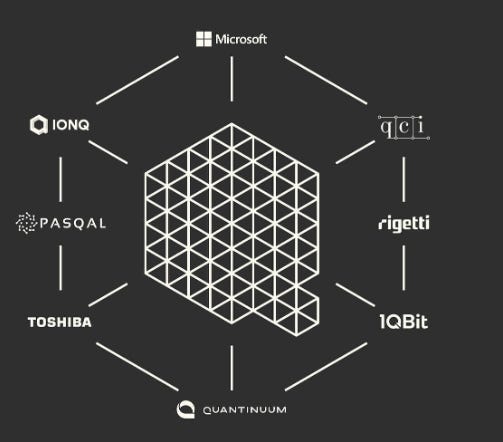US government Defense Advanced Research Projects Agency (DARPA) & Microsoft Partner in Quantum Computing
DARPA is getting cozy with Microsoft.
Hey Everyone,
In recent years the U.S. Government and Defense sector has gotten really close to Cloud computing champions of BigTech. Now this seems to be continuing with the advent of Quantum computing and Microsoft’s holy grail approach to the future qubit approach: the so-called Topological qubits.
Microsoft is taking a large-scale approach to quantum development as the US looks to develop its leadership in the technology. DARPA is sort of a big deal in terms of the future of innovation but it’s not clear if that’s really the case with quantum.
DARPA has selected Microsoft as a partner to explore scaled quantum computing in support of DARPA’s broader quantum strategies. DARPA has long been on the cutting edge of technology and plays an important role in advancing the quantum technology ecosystem.
Azure Quantum.
The Inner Circle of DARPA Quantum
This week the Defense Advanced Research Agency (DARPA), the U.S. military's boffin brain farm, announced a new endeavor, called the Underexplored Systems for Utility-Scale Quantum Computing (US2QC) program, to explore novel quantum system designs, and tapped Microsoft, Atom, and PsiQuantum to help.
The program will explore whether an underexplored approach to quantum computing is capable of achieving utility-scale operation. This even as Google spin-off Sandbox AQ get closer with the U.S. Airforce.
“The goal of US2QC is to reduce the danger of strategic surprise from underexplored quantum computing systems. We put out a call last year saying that if anyone thought they had a truly revolutionary approach to building a useful quantum computer in the near future – less than 10 years – we wanted to hear from them. We offered to collaborate by funding additional experts to join their team and provide rigorous government verification and validation of their proposed solutions to determine its viability. The ultimate outcome of the program is a win-win — for U.S. commercial leadership in this strategically important technology area and for national security to avoid being surprised.”
DARPA has selected the following companies and their novel approaches for the initial phase:
Atom Computing, based in Berkeley, California, builds highly scalable quantum computers based on large arrays of optically-trapped atoms.
Microsoft Corporation, Redmond, Washington, is building an industrial-scale quantum system based on a topological qubit architecture, which the company theorizes would enable their machine to be small enough to fit in a closet, fast enough to solve problems in a practical timeframe and have the capability to control more than one million qubits.
PsiQuantum, Corp., Palo Alto, California, is using silicon-based photonics to create an error-corrected quantum computer based on a lattice-like fabric of photonic qubits.
Level playing field? This is the sort of collaboration that China is up against in terms of Quantum Supremacy.
We see the potential of quantum computing to solve some of society’s most complex problems. This collaboration with DARPA will enable us to explore together the benefits of our unique approach in making the promise of quantum technologies a reality. - Microsoft blog
Risk Mitigation in Quantum Communications and Cybersecurity
In other words, if it is possible to build a quantum computer capable of breaking through encryption or compromising the United States' defenses in any capacity, DARPA doesn't want to be caught playing catch up with rival nations.
Qubit approaches developed by small and large companies including photonics, nuclear magnetic resonance, quantum annealing and topological quantum computing. The latter is a new focus for Microsoft and one area it will explore as part of its new Darpa partnership.




